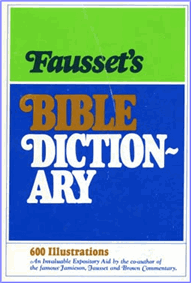Fausset's Bible Dictionary
A B C D E F G H I J K L M N O P Q R S T U V W X Y Z
Moon
yareach "yellow," and lebanah; "white" (Genesis 1:14-16, "the lesser light".) Instead of being regarded as a person and worshipped, as it was by the surrounding nations, in Scripture it is God's creature "made for signs, seasons, days, and years" (Psalm 104:19). The brightness of the moon in the East, guiding the traveler by night when the heat of day is past, gives it a prominence which it has not with us (Psalm 8:3). In Psalm 89:37 however the moon is not the "faithful witness," but God is witness to His own oath; translated "and the witness in heaven is faithful," so Psalm 89:35. So Job 16:19, "my witness is in heaven," namely, God knows my innocence. The church is "fair as the moon, clear as the sun" (Song of Solomon 6:10). As the moon shines in the night, reflecting the sun's light, so the church in this world's night (Romans 13:12) reflects the light of "the Sun of righteousness" (2 Corinthians 3:18).
Her justification in Him is perfect (1 John 4:17 ff); in herself sanctification is yet imperfect, as the moon has less light than the sun on the illuminated part, and is but half illuminated. At His coming she "shall shine forth as the sun" (Matthew 13:43). It influences vegetable growth; Deuteronomy 33:14, "moons," namely, its phases, others explain "months" as the times of ripening fruits. The cold night dews (Genesis 31:40) and moonlight hurt the eyes and health of those sleeping under it; so Psalm 121:6, "the moon shall not smite thee by night"; moon blindness is common in the East. The moon was worshipped as Isis in Egypt; as Karnaim, "two horns," of Ashtoreth, wife of Baal the king of heaven (the male and female symbolizing the generative powers of nature), in Syria; as Sin, "lord of the month," in Babylon.
Sabaism (from tsaabaa' "the heavenly hosts") was the earliest of false worships; it appears in our pagan names Sun day, Mon (moon) day; and in Job 31:26, "if I beheld the sun ... or the moon walking in brightness, and my heart hath been secretly enticed, or my mouth hath kissed my hand" in adoration. Josiah put down those who burned incense to the moon (2 Kings 23:5). She was called "queen of heaven" (Jeremiah 7:18), though that may mean Venus Urania. "Cakes" (cawanim) round like her disc were offered to her. So far from being an object of worship, it unconsciously worships its Maker (Psalm 148:3; Psalm 8:3).
The moon in Revelation 12:1 is the Jewish dispensation, borrowing its former light from the Christian but now become worldly, and therefore under the church's feet (Galatians 4:3 end; Hebrews 2:1). The sea, earth, and its satellite the moon, represent the worldly element in opposition to the sun, the kingdom of heaven. Before Jehovah the moon has no brightness (Job 25:5; Isaiah 24:23; Isaiah 60:19-20). He shall be His people's everlasting light when sun and moon shall have ceased to shine.
Bibliography Information
Fausset, Andrew Robert M.A., D.D., "Definition for 'moon' Fausset's Bible Dictionary".
bible-history.com - Fausset's; 1878.
Copyright Information
© Fausset's Bible Dictionary
Fausset's Bible Dictionary Home
Bible History Online Home
Bible Encyclopedia (ISBE)
Online Bible (KJV)
Naves Topical Bible
Smith's Bible Dictionary
Easton's Bible Dictionary
Schaff's Bible Dictionary
Fausset's Bible Dictionary
Matthew Henry Bible Commentary
Hitchcock's Bible Dictionary

Dr. A.R. Fausset
Popular and Trending:
Meaning and definition of fasting, what is fasting in the bible, fasting definition, why should I fast, the power of prayer and fasting, Location of Galilee, where was galilee in the bible?, fasting definition, Galilee region, cities of Galilee, Sea of Galilee, Definition of biblical fire, what is fire in the bible?, fire and brimstone, fire meaning, baking bread with fire, Definition of the biblical firmament in Genesis, what is the firmament in the bible?, was the firmament the third heaven, firmament meaning, did the firmament bring the flood of Noah?.
